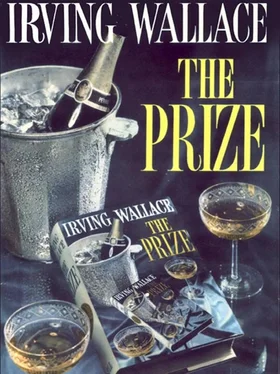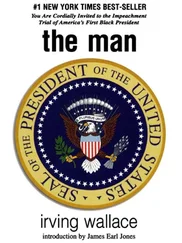It was Leah who brought the first bottle of whisky into the house and who, at least in the early months, drank with him. Later, because she had no taste for alcohol, she gave over her place to Lucius Mack.
In the beginning, the whisky was of little help, because Craig drank as he used to drink socially, and sobriety came back too swiftly. Gradually, he was able to consume more, and that was better, and gave him something to look forward to when he lifted himself out of bed each morning. The drinking made Harriet’s disappearance unreal again, which in some ways was helpful but in other ways cruel.
In the first year alone, after the day’s early intoxication, he tried to resume his long walks. Often, he would return to the house, half drunk, half sober, and trudge up to his room, and sit at his desk and stare at the photograph of her face in its leather frame. He would stare at her face and want to share some minute pleasure of the new day, something seen, heard, read, felt, and in his head he would talk to her, and then he would realize with a clutch of inner pain that she understood nothing, heard nothing, that she was only a flat image in black-and-white on glossy paper size eight by ten.
In the moments after, he would suffer a bottomless despair at life’s futility. He would drink again, still at the desk, staring at her, realizing that they had shared nothing since, not gossip and not news, that edicts had been issued from Washington and Moscow and Peiping, that discoveries had been made, that new films and books had been released, that a World Series had come and gone, and of all these things that he knew, she did not know and would never know. The trick of the mirage happened, too, in the mornings. Sometimes when he read the newspaper, he looked up intending to read an item aloud that would amuse her, and she was not across from him to enjoy it with him, because she was not there and never would be again. He had led a whole special life since her death, filled with unshared information and feelings, and he hated every part of it.
Sometimes, when he was drinking more heavily, and there was an infrequent respite, the parched desert of a sober day, he wanted to live too much. It was an odd perversity. On such a day, he would become neurotic about the possibility of dying-move the bristles of his toothbrush across his teeth twelve times, no more, no less, against death, or set the toothpaste tube at a certain angle, against death, or touch the doorknob twice in the same spot, against death. At such times, he wondered about his anxiety for life. Consciously, he would cease his compulsive little acts, and marvel that there still survived within him some fluttering hope that he was valuable to himself and to others. When he sought to approach this hope, to study it, perhaps to use it, he would become frightened and return to the bottle. He did not want to die, but even more, he was afraid to live.
With fear, and self-hatred because of fear, came his new evaluation of the place where he lived. With Harriet, it had been paradise. Alone, it was limbo. In the sober week of each month, he was critical of Miller’s Dam and wondered if he belonged here after all. There was something archaic about these small, sparse, slow Midwestern settlements. They fed the big city markets, true, and there was always talk of the important farm vote and subsidizing the farmer, and learned writings spoke of agrarian economy, but underlying was the feeling that all the fuss was about a museum, really. Craig wondered what would happen when the produce of the earth was inevitably supplanted by produce of the chemical laboratory. Would Miller’s Dam cease to exist? How would the people who lived in Miller’s Dam-‘hid’ was the better word-justify hovering outside the mainstream of the country?
He tried not to deceive himself. He tried to be blunt with himself. The thousands or the millions who populated the Miller’s Dams of the nation did so because they were afraid of life. That was it. They were anti-life. Perhaps Thoreau would have disagreed with him. Perhaps Thoreau, whom he admired, would say here was the essence of life, with the sky and earth so near and the meadow smells and the brooks and the freedom to contemplate. But in all honesty, what in the devil did these people have to contemplate with? No, he was positive that he was right, and that his poor, misguided friend from Walden’s Pond was wrong. In the twentieth century, Miller’s Dam was anti-life, a perfect hideout from competition, judgment, action, the gauntlets of urban existence. Miller’s Dam was a refuge for cowards. Men stayed here because they were scared of leaving, scared of what they might learn about themselves, and this rural womb was a better preparation for dying without disillusion. Over and over he asked himself: why am I still here? And he answered: because here no questions are offered and no demands are made. Because here was Sydney Smith’s ‘healthy grave’, the elephant’s burial ground, where the beast could die alone, out of sight and far from pity…
What aroused him, transported him in a flash from Miller’s Dam to the Malmö train bound for Stockholm, was the series of sharp rappings on his door.
Lilly.
He leapt from the berth, and shook himself alive. She had come in time, and he blessed her. There had been too much memory, too much introspection, and there would be more in the night, unless he was diverted. Lilly and the bottle were the saving smorgåsbord .
He stepped to the door and pulled it open. There was no one in sight. He looked up the train corridor. It was empty. He turned his head, and saw only the conductor at the far end, capless now, dozing over his folding table. Then, at his feet, he saw the bottle.
He took it up and retired, shutting the door, and lifting the bottle, saw that a piece of paper was fastened to it by a rubber band. He removed the paper and opened it. It read: ‘Welcome to Sweden. Lilly Hedqvist. Polhemsgatan 172C, Stockholm.’
He had looked forward to seeing her, but it did not matter, because he was tired, and the bottle was enough. It was still half filled. He propped it on the berth, stuffed her note in his pocket, and then changed into his pyjamas and brushed his teeth.
The drinking-cups were paper, and when he poured his whisky, he watched with fascination as the cup blotted up the liquid. Discarding the foolish cup, he sat down on the middle of the berth, legs crossed, and swallowed straight from the bottle. The fluid was welcomed by every taut nerve in his system, and he continued to gratify his body by drinking steadily.
In an hour the bottle was empty, and he was satisfied. Thank you for me, he told the bottle without speaking, and thank you for my body. He pushed the bottle under the berth, turned down the lights, and crawled under the cover.
Stretched flat and inert, he was momentarily nauseated. Behind his eyelids the scene loomed. Their speed was moderate, because the highway was wet. The curve, which was sharp, he had met and traversed hundreds of times. Unthinking, he had flicked the wheel, and the station-wagon had left him, gone out from beneath him, as a child’s legs the first day on roller skates. Harriet, head thrown back on the seat, had been saying lazily, ‘I had a lovely day, didn’t you?’ But he could not reply, because there was this unruly, shocking thing happening to him. They had skidded completely around, smashed into the fence along the embankment, rolled over once into the ravine, and pancaked in a geyser of metal and wood and glass against an oak tree. That was it, and that was all, and later he remembered that he had taken four drinks and that he had meant to reply to Harriet, ‘Yes, yes, my darling, the loveliest day of my life with you.’
The nausea passed, and the scene, and he curled on his side to sleep. It did not come immediately. Instead, a memory he had missed floated to the surface. The last time he had slept with Harriet had been three days before his birthday, in the morning, when he had kissed her awake, and she had pulled him down.
Читать дальше












